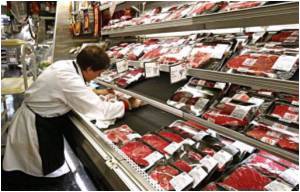Men find vegetables unmanly and stick to meat, shows study.

Most of the studies took place in the United States and Britain, but the authors also analyzed 23 languages that use gendered pronouns. They discovered that across most languages, meat was related to the male gender.
"To the strong, traditional, macho, bicep-flexing, All-American male, red meat is a strong, traditional, macho, bicep-flexing, All-American food," the authors write. "Soy is not. To eat it, they would have to give up a food they saw as strong and powerful like themselves for a food they saw as weak and wimpy."
If marketers or health advocates want to counteract such powerful associations, they need to address the metaphors that shape consumer attitudes, the authors explain. For example, an education campaign that urges people to eat more soy or vegetables would be a tough sell, but reshaping soy burgers to make them resemble beef or giving them grill marks might help cautious men make the transition.
"In marketing, understanding the metaphor a consumer might have for a brand could move the art of positioning toward more of a science," the authors conclude.
Source-Eurekalert
 MEDINDIA
MEDINDIA




 Email
Email





